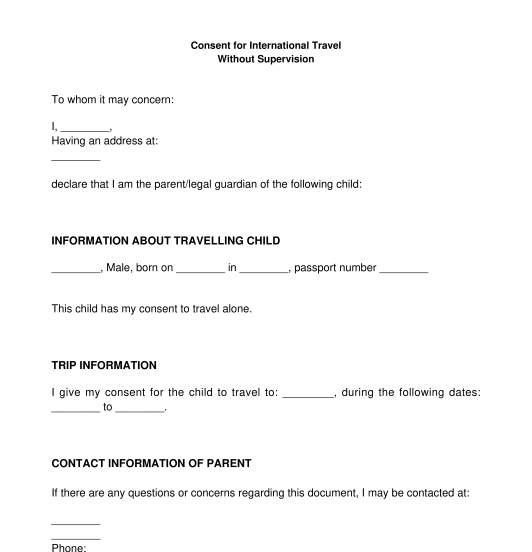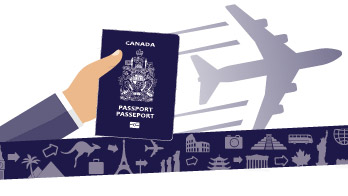Do You Need a Child Travel Consent Form?

Are you planning a family vacation abroad with your children ? If you are travelling without the child’s other parent due to a separation or divorce , there are various matters to consider before packing your bags, as issues may arise when crossing the Canadian border with your children alone. To ensure your trip runs smoothly, it is critical to be proactive in obtaining the necessary paperwork and documents you may need throughout your travels, including travel consent forms.
This blog post will explain what travel consent forms are and will explore commonly asked questions regarding these documents.

What is a travel consent form?
A travel consent form is a consent letter , provided by a parent or guardian who is not accompanying the child on a trip, which confirms that the child has permission to travel outside of Canada.
Why do I need to have a travel consent form?
Using a travel consent form can help protect your child against international child abduction . International child abduction can occur when one parent travels abroad with their child without the other parent’s permission. Specifically, this applies to parents with parenting time or decision-making powers for the child. On a practical basis, having a travel consent may make it easier to pass through Canadian and foreign passport control.
Canada is a signatory to the 1980 Hague Convention on the Civil Aspects of International Child Abduction , which promotes the protection of “children internationally from the harmful effects of their wrongful removal or retention and to establish procedures to ensure their prompt return to the State of their habitual residence, as well as to secure protection for rights of access.” In Ontario, section 19 of the Children’s Law Reform Act outlines one of its purposes to “discourage the abduction of children as an alternative to the determination of decision-making responsibility by due process.”
However, international child abduction does not only happen when a parent leaves Canada with a child. Canadian laws may be engaged if a parent comes to Canada with a child from a different country without the other parent’s consent. To learn more about how Canadian law responds to parents travelling to Canada with children without the other parent, you can read our blog post “ Parenting Conflicts Cross Borders in International Child Abductions .”
When is a travel consent form required?
The Canadian government recommends that a travel consent form be signed and used for all international travel when a child travels alone, with only one parent, with friends or relatives, or with a school, sports or religious group. It is also recommended that parents who are not joining the child on a trip sign a travel consent form for international travel. This recommendation applies to all trips abroad, regardless of the mode of transportation or the trip duration.
In situations where both parents are present at the beginning of the trip, but one parent stays abroad with the child longer than the other, it is still recommended to make use of a travel consent form.
While Canadian law does not necessarily require travel consent forms, the Canadian government still recommends using a travel consent form.
Do I need a travel consent form if we are married or common-law?
In cases where the child’s parents are married or common-law, it is still recommended that the parent who is not travelling with the child should sign a travel consent form. The parents’ marital status is not necessarily a relevant consideration for international travel, but rather, the fact that the child’s parents have an interest in their child’s travel plans.
What if I am separated or divorced?
If you are separated or divorced, the Canadian government suggests that the travel consent letter should be signed by the parent who is not accompanying the child on the trip if they have either parenting time or decision-making responsibility for the child.
What if I am the only parent of my child?
There are various reasons why you may be considered the only parent of your child.
If you have are a child’s sole parent, it is recommended that you bring a document demonstrating that you are the child’s only parent, such as a long-form birth certificate or, if the child’s other parent has died, you are encouraged to bring a copy of the other parent’s death certificate when travelling alone with your child.
Does a travel consent form need to be notarized?
There is no legal requirement for a travel consent form to be notarized. However, the Canadian government recommends that the travel consent form be signed and witnessed before a notary public. A travel consent form that is notarized may help minimize questions regarding the letter’s authenticity.
At what age does my child no longer require a travel consent form?
Just like the age of majority differs in each province and territory, the age requirement for consent letters can vary. In Ontario, the age of majority is 18. However, as a precaution, the Canadian government recommends preparing a travel consent letter for any child under the age of 19 years old.
Do all of my children need a signed travel consent form?
If more than one of your children is joining you on your trip, the government allows each child from the same family to be named on one single travel consent form. For example, if you have two children with your previous spouse, both children can be on the same travel consent form. However, if you are travelling with two children with your previous spouse as well as a child from your second marriage , you would require two travel consent forms – one signed by the parent of your two children, and one signed by the spouse of your second marriage.
What information is required in a travel consent form?
While there are no legal requirements for the information contained in a travel consent letter, the government provides a general checklist of information that the signed travel consent form should contain, including:
– The name of the child;
– The names and contact information of the parents or guardians;
– The name and relationship of the person who is travelling with the child; and
– Information about whether the child is travelling and how long the trip will be.
To ensure that your travel consent form adheres to the recommended guidelines, it is important to consult with a trusted family law lawyer. In cases where one parent has concerns over international child abduction, for example if the other parent travels with a child without a specific return date or engages in frequent international travel with your child, it is also critical to speak with an experienced lawyer to ensure you are aware of your rights and options under the applicable laws.
Contact the Family Lawyers at Boulby Weinberg LLP for Trusted Advice Regarding International Travel with Children
The skilled family lawyers at Boulby Weinberg LLP in Toronto can help make your travel plans easier and put your mind at ease before your next trip. Regardless of whether both parents agree to the trip, or you are concerned about the risk of international abduction , our family law team is ready to help. We have extensive experience advising clients on complex international matters regarding international child abduction and we provide clients with tailored solutions to ensure that their children return home safely.To speak with a member of our team regarding your travel concerns, please contact us online or call our office at 647-494-0113 ext. 102.

How does it work?
1. choose this template.
Start by clicking on "Fill out the template"
2. Complete the document
Answer a few questions and your document is created automatically.
3. Save - Print
Your document is ready! You will receive it in Word and PDF formats. You will be able to modify it.
Travel Consent Letter
Rating: 4.5 - 309 votes
A Travel Consent Letter is used when a child is travelling alone, with only one parent/legal guardian, or with an authorized group. This document notifies authorities or other interested parties that a parent or legal guardian has given their consent for the child to travel without them. This document can be used both for domestic travel inside Canada or international travel across country borders. Because of increasing instances of child abduction in custody cases, and a growing number of children who are the victims of trafficking or other abductions , an immigration officer, airline, or travel company may ask parents to provide some form of letter of consent if a minor child is travelling internationally with only one parent or with another adult, such as a teacher, group trip leader, or grandparent.
How to use this document?
Using this document, a parent can name the children , provide information about their passport if the trip is happening internationally, describe the circumstances of their trip and the people who will be accompanying them, and outline the travel itinerary . Finally, this letter form contains contact information for adult chaperones, if applicable, and parents or legal guardians in case someone needs to be contacted in the event of an emergency. During the signing of this letter, a witness should also sign the letter, as this is required by some airlines.
Travelling children should carry a copy of this letter with them and any adult chaperones should be given a copy of this letter to show to authority figures as needed.
Applicable Law
Although not required by law, immigration officers, law enforcement officers, or custom agents may detain a child if they suspect an abduction or kidnapping has taken place. By travelling with a Travel Consent Letter, these officers will have the necessary contact information and further assurance that no abduction or kidnapping has taken place. Remember that specific requirements for the Travel Consent Letter may vary from country to country or airline to airline. Therefore, it is vital to research the specific guidelines and templates relevant to your travel destination and carrier. Taking these proactive steps can significantly contribute to a stress-free and efficient travel experience for all parties involved.
How to modify the template?
You fill out a form. The document is created before your eyes as you respond to the questions.
At the end, you receive it in Word and PDF formats. You can modify it and reuse it.
A guide to help you: How to Travel with Minor Children
Other names for the document:
Child Travel Consent Letter, Children's International Travel Consent Letter, Consent Letter for Child Traveling Abroad, International Travel Consent Letter, Minor Travel Consent Letter
Country: Canada (English)
Marriage, Divorce and Family - Other downloadable templates of legal documents
- Last Will and Testament
- Codicil to Last Will and Testament
- Marriage Agreement
- Child Support Agreement
- Child Support Application Letter
- Spousal Support Letter
- Cohabitation Agreement
- Separation Agreement
- Other downloadable templates of legal documents

Language selection
- Français fr
Travel and identification documents for entering Canada
From: Canada Border Services Agency
October 1, 2022 : COVID-19 emergency border measures ended
Refer to COVID-19: Travel, testing and borders for details.
Make sure you carry proper identification for yourself and any children or minors travelling with you. You must be able to confirm your legal right or authorization to enter Canada at the border.
On this page
Residents returning to canada, travel with children and minors, international visitors to canada, electronic travel authorization, fake websites, related links.
Planning travel to Canada? Visit COVID-19 : Entering Canada requirements checklist for information about quarantine and your admissibility to Canada.
Carry a valid Canadian passport for all visits abroad, including visits to the United States (U.S.). It is the only universally accepted identification document, and it proves that you have a right to return to Canada.
Acceptable documents to denote identity and citizenship
Other acceptable documents for establishing canadian citizenship, other acceptable documents to support identity, acceptable documents for establishing registered indian status and identity.
Upon arrival at a Canadian port of entry, travellers must satisfy a CBSA border services officer (BSO) that they meet the requirements for entry into Canada. For Canadian citizens, permanent residents and persons registered under the Indian Act, this can be done through questioning and through verifying documentation such as a:
- Canadian passport
- Canadian birth certificate
- permanent residence card
- citizenship card
- Secure Certificate of Indian Status (SCIS) card or valid Certificate of Indian Status (CIS) card
If you do not have a passport, and are returning to Canada, the following documents can denote identity and citizenship :
- NEXUS card, held by a Canadian citizen, when entering Canada by air (when coming from the U.S.), land, or marine modes
- FAST card (Free and Secure Trade), issued to a Canadian citizen (when arriving by land or marine modes only)
- Canadian emergency travel document
- Canadian temporary passport
- Certificate of Canadian citizenship (issued from 1954 to present)
- Enhanced driver's license issued by a Canadian province or territory
- Enhanced identification/photo card issued by a Canadian province or territory
Permanent residents of Canada who are members of the NEXUS or FAST programs must travel with a passport and proof of permanent residence , and may be asked to present these documents to the officer upon arrival at the border.
The following documents may be used to establish Canadian citizenship . Upon presentation by travellers, the documents should be supported by other government issued photo identification:
- Certificate of Canadian citizenship (large form issued between January 1, 1947, to February 14, 1977)
- Certificate of retention (issued between January 1, 1947, and February 14, 1977)
- Certificate of naturalization (issued before January 1, 1947)
- Registration of birth abroad certificate (issued between January 1, 1947, and February 14, 1977, by Canadian citizenship authorities)
- Provincial or territorial birth certificate (individuals born in Canada)
The following documents may be used to establish your identity :
- CANPASS card (air, corporate air, private air, remote area border crossing), held by a Canadian citizen
- Commercial driver registration program card, held by a Canadian citizen
- Provincial and territorial driver's license
- Employment or student card with photo and signature
- Provincial health insurance card
- Provincial identity card
- Canadian Forces identification
- Police identification
- Firearms acquisition certificate
- Credit card
- Vehicle insurance certificate
- Vehicle registration
Every person registered under the Indian Act can enter and remain in Canada by right as per subsection A19(1) of the Immigration and Refugee Protection Act . The Secure Certificate of Indian Status (SCIS), more commonly referred to as the Status card, is an identity document issued by Indian and Northern Affairs Canada confirming that the cardholder is registered as a Status Indian under the Indian Act .
Note: The Certificate of Indian Status (CIS) was replaced by the SCIS in 2009. Existing versions of the CIS will remain valid until their renewal date.
If you plan to travel to or transit through the U.S., we encourage you to visit the U.S. Customs and Border Protection website for information concerning the U.S. Western Hemisphere Travel Initiative, and the requirements to enter or return to the U.S.
For information on Canada-U.S. border-crossing issues, visit Crossing the Canada-U.S. border with a status card .
When travelling with a minor, you should:
- carry copies of any legal custody documents, such as custody rights, if applicable
- arrive at the border in the same vehicle as the minor
- you share custody of the minor and the other parent or legal guardian is not travelling with you
- you are not the parent or legal guardian of the minor
A consent letter must include the custodial parents' or legal guardians':
- telephone number
Border services officers are always watching for missing children and may ask questions about any minors travelling with you.
To avoid delays, have your consent letter notarized to support its authenticity. For more information on consent letters and to download an interactive form, visit Recommended consent letter for children travelling abroad .
More information
- Children and travel
- Our Missing Children program
Check Travel health measures
All international travellers must carry acceptable identification and a valid visa (if necessary) when entering Canada. A passport is recommended because it is the only reliable and universally-accepted travel and identification document for the purpose of international travel.
International transport companies, such as airlines, must make sure that travellers have proper, valid travel documents. If you do not have the proper documents, you may be delayed or refused entry into Canada . What you need will depend on where you are from, how you are travelling, and what documents you are travelling with. Consult entry requirements by country .
When you enter Canada, a border services officer will ask to see your passport and a valid visa, if you are arriving from a country for which one is required. Visit the Immigration, Refugees and Citizenship Canada website to learn more about what travel documents are required.
Citizens of the U.S. who are members of the NEXUS program may present their membership card as proof of identification and as a document that denotes citizenship, when arriving by air (when coming from the U.S.), land, or marine modes.
Citizens of the U.S. who are members of the FAST program may use their cards as proof of identity when arriving by land and marine modes only.
Permanent residents of the U.S. who are members of the NEXUS or FAST programs must travel with a passport and proof of permanent residence , and may be asked to present these documents to the officer upon arrival at the border.
All visitors arriving from or transiting through the U.S. are encouraged to visit the U.S. Customs and Border Protection website for information concerning the U.S. Western Hemisphere Travel Initiative, and the requirements to enter or return to the U.S.
Visa-exempt foreign nationals need an Electronic Travel Authorization ( eTA ) to fly to or transit through Canada.
Exceptions, or visa and eTA-exempt foreign nationals, include:
- U.S. citizens
- U.S Lawful Permanent Residents
- travellers with a valid Canadian visa
- Other exceptions
Canadian citizens, including dual citizens, and Canadian permanent residents do not need to apply for an eTA.
Foreign nationals from select visa-required countries may also travel to or through Canada by air using an eTA , if eligible .
Be prepared: Apply for an eTA before you book your flight to Canada. Most applicants get approved within minutes. However, some applications can take several days to process so don’t wait until the last minute.
- Apply for an Electronic Travel Authorization
- Get help with Electronic Travel Authorizations
- Dual citizens
- Canadian permanent residents
- Lawful permanent residents of the U.S.
Travellers who apply for an eTA are advised to be cautious in all dealings with companies that claim to offer help in getting an eTA. These companies are not operating on behalf of the Government of Canada. Many have established websites that charge a fee to provide information and submit eTA applications.
This Government of Canada website is the official place to apply for an Electronic Travel Application .
- Travelling with animals
- Lost, stolen, seized, inaccessible or damaged passports
- Find out if you need a visa to travel to Canada
- Programs for trusted travellers
Why You Need a Travel Consent Letter When Travelling with Your Child

The winter season is upon us, and March Break is just around the corner, which means many Ontarians are planning vacation travel plans.
However, travelling with your children isn’t always so simple if you’re separated , divorced , or without your spouse. That’s where travel consent letters come in.
We’ll explain travel consent letters, how they work, and what parents should know about using them when travelling with their children. We’ll also touch on the risks associated with international travel and what parents can do to protect themselves if they have concerns about another parent travelling outside the country with their child.
What is a Travel Consent Letter?
A travel consent letter is a document signed by one or both parents granting their consent for their child to travel with the other parent (or another person).
Travel consent letters are commonly used by separated parties (for example, where one parent intends to take the child or children on holiday). Still, they may also be needed in the following scenarios:
- Where the parents are not separated or divorced, but only one parent is travelling with a child (this is especially important if the child does not have the same last name as the parent they are travelling with);
- Where the child is travelling with both parents but will be returning to Canada with only one parent;
- Where the child is travelling with a relative (for example, a grandparent) or
- Where the child is travelling with unrelated parties (for example, if the child is travelling out of the country on a school trip).
What Does a Travel Consent Letter Do?
A travel consent letter provides border authorities with evidence of a parent or parents’ consent for their child to travel out of the country with another person.
Contrary to popular belief, travel consent letters are not legally required for cross-border travel—though they may be requested by immigration authorities when entering or leaving a foreign country. Therefore, preparing a travel consent letter is prudent whenever your child travels without both parents.
It’s equally important to remember that travel consent letters aren’t legally binding. Possessing a travel consent letter doesn’t guarantee that a child will be allowed entry into another country without their parents.
What Information Should a Travel Consent Letter Contain?
Technically, there aren’t any requirements for what information should be contained in a travel consent letter (though plenty of sample consent letters are available online, including the Government of Canada’s sample travel consent letter ). However, it’s generally best to include as much information as possible in your travel consent letter and to ensure you’re providing, at a minimum, the following information:
- The full names, contact information, and signatures of the person or persons given consent;
- The child’s full name, date of birth, place of birth, and passport number;
- The accompanying parent or individual’s full name, relationship to the child, contact information, and passport number;
- The travel destination, including the purpose of travel and address where the child will be staying; and
- The travel dates.
Who Can Sign or Witness a Travel Consent Letter?
The parent or parents providing consent for their child to travel must sign the travel consent letter. They’ll also need to ensure that another person witnesses their signature and that that person also signs the document.
While any adult can be a witness for a travel consent letter, the best practice is to have your lawyer witness the document and affix their stamp and notarial seal to it, as immigration officials may be less likely to question its authenticity.
What Other Documents Do I Need?
Beyond the child’s passport and other essential travel documents, the parent or person travelling with a child may need to bring other documents. For example, if the child’s parents are separated, immigration authorities may request a copy of the parents’ divorce papers and any custody agreements or orders.
Key Considerations When Travelling with Children of Separated or Divorced Parents
As noted above, travel consent letters are extremely valuable when a child is not travelling with both parents.
However, while travel consent letters are a great way to document a child’s travel plans and their parent or parents’ consent to those plans, they do not give parents or other persons carte blanche to travel with a child. Depending on the destination country, the purpose of travel, or other factors, immigration authorities may not permit a child to enter the country.
Consider also that a travel consent letter does not protect against the risks associated with international travel. Many parents ask whether travel consent letters protect them from another parent travelling with a child and preventing the child from returning to Canada. Unfortunately, a travel consent letter (even one that provides specific travel dates) does not technically prevent the other parent from extending their stay in the other country with the child.
What to Do in Parental Child Abduction Situations
Situations where a parent takes a child outside of Canada (or keeps them from returning to Canada) in breach of a custody agreement or court order are referred to as “parental child abduction.”
Parental child abduction is a crime under sections 282 and 283 of Canada’s Criminal Code , R.S.C. 1985, c. C-46 . If a parent has abducted your child (or you suspect that a parent may be attempting to abduct a child) in these circumstances, contact an experienced family law lawyer or Global Affairs Canada ’s Case Management Division for emergency assistance.
Avoiding Parental Child Abduction
If you believe that a trip abroad with a parent may lead to parental child abduction, it’s critical to take steps to prevent the situation from happening. Some steps that can help include the following:
- Ensure your parenting or custody order includes conditions relating to international travel.
- Secure your child’s passport.
- Maintain contact with your child and the other parent.
- Consult Global Affairs Canada for further information about preventing child abduction (in particular, their guide, International Child Abduction: A guide for affected parents ).
- Speak with an experienced family law lawyer for advice about your situation and additional steps that can help you prevent parental child abduction.
Remember, at the end of the day, there are many resources available to parents that can help navigate complicated parenting situations. Working with an experienced family law lawyer in these cases can help you protect your rights and bring you peace of mind.
Skilled and Compassionate Ottawa Family Lawyers Assisting Parents With Their Family Law Matters
Navigating parenting after a separation or divorce can be challenging, particularly regarding issues like international travel. At Tierney Stauffer LLP , we empower clients with the information needed to help them understand their rights, obligations, and options. Our team offers skilled yet practical legal advice to help parents preserve their rights and protect their interests – all while avoiding unnecessary conflict. To schedule a confidential consultation about your family law matter, contact us at 1-888-799-8057 or online .
Full Name (required)
Email Address (required)
Phone Number
Message (required)
Please leave this field empty.
I have read the Privacy Policy and Disclaimer .
- Skip to main content
- Skip to site information
Language selection
Help us to improve our website. Take our survey !
Travel documents
Know which documents you need and where to get them to make your travel quick and easy.

Identification documents
Canadian passports.
A passport is the only reliable and universally accepted travel identification document and it proves that you have a right to return to Canada
Canadian Travel Number
Avoid delays at the airport because your name is the same as, or similar to, that of someone on the No Fly List ( Secure Air Travel Act list)
NEXUS
If you travel between Canada and the United States often, a NEXUS card will save you time at the border
Permanent resident card
Permanent residents of Canada need a permanent resident card to re-enter Canada
Pre-boarding identification requirements
Information on the identification documents you need to bring to the airport
Travel documents for non-Canadians
Travel documents for convention refugees, protected persons or stateless persons living in Canada
Permits and certificates
Find out whether you need a visa for your destination and get it well in advance of your trip
Certificate of Canadian citizenship
A Canadian citizenship certificate is not a valid travel document
CITES permits
Information on permits to transport, import or export a listed wildlife species or items made from listed wildlife species
International Driving Permit
Your Canadian driver's licence may not be valid in your destination country
Travelling outside Canada with your vehicle
You may need a Carnet de Passages en Douane (CPD) to travel outside Canada with your vehicle.
International Certificate of Vaccination or Prophylaxis
Some countries may require you to show proof of vaccination
Your pets need travel documents to enter another country
CANPASS - Private aircraft
CANPASS cards allow private aircraft to clear customs and immigration quickly and securely
More information
Consent letter for children travelling abroad.
A consent letter helps children travelling without both parents to enter foreign countries and re-enter Canada
Marriage outside Canada
Information on the legal issues involved in getting married abroad
Notarial services
Information about getting notarial services while you are outside Canada
Travelling as a dual citizen
Information for Canadian dual citizens who are travelling to another country where they have citizenship
Travel insurance
Buy travel insurance before you travel outside Canada. Bring your insurance information with you. You may need to prove you have travel insurance to enter some countries
Mobile Passport Control app
Travellers can shorten the entry process to the U.S. by submitting their passport and customs declaration information through this app
What we are doing
Policies, acts and regulations.
- Canadian Passport Order
- Citizenship Act
- Identity Screening Regulations
Publications
- Bon voyage, but... Essential information for Canadian travellers
- Travelling with children
All related publications
- Apply online for a visa, study or work permit
- Steps to complete a passport application
- Nexus application
- CANPASS application
- CITES permit application forms

Find helpful information on health and safety, travel documents, baggage, airport security, country advice and more.

Information on a recommended consent letter for Canadian children travelling abroad.

You need a valid Canadian passport to board a flight to Canada.

Obtaining a Travel Consent Letter

Children of separated parents sometimes get to have two of everything – two homes, two rooms, two neighbourhoods… sometimes even two summer vacation trips! Each parent usually has a different vacation plan in mind for the year, and it takes honest and cordial communication between the parents to coordinate who gets to take the kids when and where during some of the more popular holidays such as Christmas Break, March Break, and Summer Break.
Aside from making sure that the other parent consents to the location and duration of the vacation, the next most important step in ensuring that your holiday is enjoyed to the fullest without family law complications is having a signed travel consent letter.
Is a Travel Consent Letter Required By Law in Ontario? Why Would I Need This?
Although a consent letter is not required by any statute or legislation, it is tremendously helpful in clarifying any misunderstandings that might ruin your family vacation.
For example, mishaps at the border sometimes occur when a child has a different last name (as is sometimes the case with separated or divorced parents, or parents who do not have the same last name), and/or appears to be lacking a resemblance to, or of different ethnic background from the parent who is travelling with the child. Immigration authorities, in both Canada and foreign countries, might, based on these circumstances, suspect that child abduction is taking place based on the fact that there appears to be a lack of ‘familial’ relationship.
Whether this is acceptable behaviour by the government authority is up for debate. Nonetheless, a travel consent letter would be helpful in clarifying such cases. A travel consent letter indicates that the child has permission to travel abroad from parents or guardians who are not accompanying them on the trip. Although carrying a consent letter does not guarantee that children will be allowed to enter or leave a country, having one is a simple proactive step that can greatly reduce the anxieties and uncertainties that you do not want to be experiencing whilst on your much-anticipated family vacation.
It should be noted that sometimes a travel consent letter may be required based on the family’s parenting agreement or an order made by the court. You should review your domestic contract, or any existing court order relating to parenting issues to see if there are any requirements you must fulfill in order to travel with your child.

What Are Some Common Travel-Related Stipulations?
Some of the most common travel-related requirements that may exist in a parenting agreement or a court order include the following:
- Who can apply for and renew the children’s passport – for children under 16 years of age, the parent who has custody may apply for their passport. If the parents have joint custody, then either parent may apply with the written consent of the other. Sometimes consent of the other parent may be dispensed.
- Who has possession of the children’s passport.
- What specific details of the trip must be made known to the other parent – this information may include details of the itinerary, addresses and contact information of places of accommodation, flight carrier information, and how to reach the child during the vacation.
- Notice of travel – this requires that the parent proposing vacation to give proper notice to the other parent of the vacation plan a certain number of days in advance of the trip.
- Travel authorization – this requires that one or both parents receive a consent form or letter authorizing the travel from the other parent before they leave for their trip.
- Non-removal clause or order – this requires that one or both parents do not remove the child from the city, province, or country without the consent of the other parent or a court order.
If you are concerned that the other parent might remove the child to another jurisdiction or country without your consent, or permanently relocate from where the child usually lives, you should speak with a qualified family law lawyer about including a non-removal clause in a parenting agreement. This is particularly the case if the other parent has indicated at any point that he or she wishes to permanently move to a different province or country, has significant community support or extended family in a different jurisdiction, and/or there is no agreement or court order in place.
Who Should Sign the Travel Consent Letter?
It is recommended that everyone who has a legal right to make major decisions for the child and is not accompanying the child on the trip, signs the consent letter. This may not necessarily be limited to the other parent. For example, if a grandparent has (temporary or final) custody of the child, or if the child is in temporarily placed in the care of an organization in accordance with the Child, Youth, and Family Services Act , consent and signatures from these individuals and/or organizations must also be sought before going on a vacation.
What Needs to be Included in the Travel Consent Letter?
The following are some of the most basic pieces of information you should consider including in the letter:
- Full names of people/organizations giving consent
- Contact information for each of the above
- Full name, date and place of birth, and passport number of the child
- Full name, passport number, and relationship to the child of the accompanying parent
- Travel dates and destinations
- Dated signature of the people/organizations giving consent and witnesses
The Government of Canada has curated a template consent letter for children travelling abroad . Note that this is only a template recommended by the government, and is not necessarily what is required for the purpose of travel.
It is imperative that the letter includes the date on which the child is to return home. This minimizes the ambiguity of the travel consent and can alert immigration authorities if the travelling parent is in contravention of the agreed duration of the trip.

Does This Letter Guarantee the Child’s Entry Into the Country?
The immigration authorities of each country have the right to dictate who they let in and out of the country. The letter assists in clarifying that the child is permitted to travel with you, but the ultimate decision is up to the border agents of the destination country. It would be most prudent for you to check the Travel Advice and Advisories, posted and regularly updated by the federal government before you begin planning for your trip. The website provides some helpful information and travel advisories including local security conditions and areas to avoid, entry and exit requirements, possible health hazards, and natural hazards and climate of each country.
What are Some Other Documents that I Should Carry?
Some parents carry a photocopy of the child’s birth certificate or Canadian citizenship certificate. Some foreign jurisdictions may ask for a copy of the divorce papers and/or custody orders. Again, these are not necessarily required for any or all travel destinations, and the best practice is to consult the Travel Advisories webpage when planning for your trip.
I did not consent to my child travelling with the other parent. Nonetheless, s/he removed the child out of the country. What should I do?
Regrettably, parental child abduction remains an all too prevalent crime in Canada. Parental child abduction contravenes sections 282 and 283 of the Criminal Code and may be punishable by up to 10 years in prison if found guilty.
If you think your child is a victim of parental abduction, immediately contact the Case Management Division of Global Affairs Canada to arrange emergency assistance from the Canadian embassy or consulate of the country to which you believe your child has been taken.
If you were not aware that the child had a passport, or if you did not consent to the application of passport, it might be a good idea to make a request for the child’s information to be entered into Passport Canada’s System Lookout List.
It is also highly recommended that you speak with a family lawyer to learn about your parental rights. This is particularly important because a Canadian child custody order might not be automatically recognized by some countries; different countries have different legal systems with respect to family law and local customs. Furthermore, the Canadian government officials abroad CANNOT represent you or intervene in private legal matters; they cannot provide you with legal advice on family law issues. The government authorities are in place to help ensure that the safety of the child, and to request assistance from local authorities in locating and assessing the living conditions of the child.
Closing Remarks
Vacations are precious opportunities during which a parent can form everlasting memories with their child. Your hard-earned holiday should not be dampened by logistical glitches – especially when said glitches could have been easily prevented by adopting proactive measures in the form of a travel consent letter. This blog post was written for general education purposes, and you shouldn’t rely on it to make your travel plans. Consult with a legal professional at Kain & Ball to find out what your parental rights and responsibilities to enjoy your vacation to the fullest.
The above information is NOT legal advice of any kind, and you should be sure to speak to a qualified family law lawyer about your specific situation. For more information, on how to find justice during a pandemic, call us at 905-273-4588 or email us at [email protected] to book a free 30-minute consultation with one of our experienced family law lawyers at Kain & Ball Family Law.
E-MAIL: [email protected] TOLL FREE : 1-855-773-4588 MISSISSAUGA LOCAL : (905) 273-4588 TORONTO LOCAL : (647) 499-4888
PRACTICE AREAS
- Separation And Divorce
- Child Support
- Spousal Support
- Child Custody
- Alternative Dispute Resolution: Mediation-Arbitration
- Division Of Property
- Prenuptial Agreements
- Mediation Services
- Interjurisdictional Custody And Access
Mississauga Office
KAIN & BALL PROFESSIONAL CORPORATION 1290 Central Parkway West, Suite 402, Mississauga, Ontario L5C 4R3
Toronto Office
KAIN & BALL PROFESSIONAL CORPORATION TD Canada Trust Tower, 161 Bay Street, 27th Floor, Toronto, Ontario M5J 2S1
© 2024 Kain & Ball Family Law. TERMS OF USE | DISCLAIMER | PRIVACY POLICY
- Separation & Divorce Lawyers
- Arbitration
- Marriage Contracts
- Interjurisdictional Custody And Access Disputes
- Corporate Social Responsibility
- COVID-19 Response
- Free Consultation
Travel Consent Letter: Is It Legally Required?
In case your child travels abroad, it is recommended to notarize a Travel Consent Letter. All-Canada Notary can help you with notarization of your child’s consent letter. It can be notarized online / remotely or in-person in one of our offices by a licensed notary public.

What Is a Travel Consent Letter?
A travel consent letter is a document that provides authorization from a parent or guardian for a child to travel alone or with someone other than their parents.
Is a Travel Consent Letter Legally Required?
While a consent letter is not a legal requirement in Canada, some other countries may refuse to allow your child to enter if the consent letter is not provided. It can simplify travel for Canadian children as it may be requested by immigration authorities when entering or leaving a foreign country or by Canadian officials or airline agents when re-entering Canada. The Government of Canada strongly recommends that this is done.
Do I Need to Notarize a Travel Consent Letter?
A notarization for the letter is not a legal requirement, but it is highly recommended by the Canadian government. Because notaries have the legal power to verify that signatures are true and genuine, your consent to travel letter is more likely to be accepted as authentic by immigration authorities.
Please do not sign any documents required to be notarized or commissioned until you meet our notary public, as we need to see you sign the document as required by law.
Can This Letter Be Notarized Online?
The travel consent letters can be notarized online. You can book an appointment with us today and have your consent letter notarized remotely. Book an appointment here
When Is A Travel Consent Letter Required?
There are certain conditions that require the child to have a travel consent form to travel outside the country. Some of the conditions include:
- When children are traveling alone without a parent or a guardian.
- If a child is traveling with only one legal parent.
- When the child is traveling with a legal guardian.
- If the child is traveling with a group for a school or college outing.
Minors Travelling within Canada
Minors (individuals under 18 years of age) should carry identification when traveling within Canada. While a passport is not mandatory for domestic travel, it is highly recommended, especially for air travel. Other accepted forms of identification for minors may include a birth certificate, citizenship card, or provincial/territorial identification card.
Can You Use a Copy of the Consent Letter Or Original?
It is generally recommended that the person accompanying a child carries the original signed letter rather than a copy. While officials may accept a copy of the letter, having the original document can help establish the authenticity and legitimacy of the letter.
At What Age Consent Letter Is Not Required?
The age of majority is generally 18 years old in most provinces and territories, including Ontario, British Columbia, Alberta, and Quebec. However, there are a few exceptions: In Manitoba, New Brunswick, Newfoundland and Labrador, Northwest Territories, Nova Scotia, Nunavut, Prince Edward Island, Saskatchewan, and Yukon, the age of majority is 19 years old .
Because the definition of a child varies from country to country, so any child under 19 years old should carry a consent letter.

What Should a Child Travel Consent Letter Contain?
A child travel consent form in Canada should contain the following information:
- Child’s Information: Full name, date of birth, and passport information (if applicable) of the child traveling.
- Parent/Guardian Information: Full name, address, contact information, and relationship to the child of the parent(s) or legal guardian(s) providing consent.
- Travel Details: Dates of travel, destination(s), purpose of travel, and mode of transportation (flight, train, etc.).
- Accompanying Adult(s): Full name, address, contact information, and relationship to the child of the adult(s) who will be accompanying the child during the trip.
- Consent Statement: A clear and unambiguous statement indicating that the parent(s) or legal guardian(s) consent to the child traveling with the accompanying adult(s) for the specified period and purpose.
- Notarization: The consent form should be notarized or witnessed by a legal authority, such as a lawyer or notary public. This adds credibility and authenticity to the document.
- Contact Information: Provide emergency contact information for the parent(s) or legal guardian(s) in case of any unforeseen circumstances.
- Copies of Supporting Documents: It is advisable to attach copies of the child’s birth certificate, passport, and any other relevant identification documents.
- Additional Instructions: Any specific instructions or restrictions related to the child’s travel, such as medical conditions, allergies, or necessary medications, should be clearly stated.
Who Should Sign the Consent Letter?
Generally, if a child is traveling with only one parent or without either parent, it is recommended to have a travel consent letter signed by the non-accompanying parent . In cases where the child is traveling with someone other than their parents, both parents may need to provide a travel consent letter.
If neither parent is accompanying the child, they can both sign 1 letter or they can each sign a separate letter. Children from the same family who are travelling together may be listed on 1 (one) letter
If Parents Separated or Divorced
Parents who are not accompanying the child travelling outside Canada and who have 1 of the following:
- custody of the child
- decision-making responsibility for the child
- guardianship of the child (in Alberta and British Columbia
If One of The Parents Is Deceased?
It is preferable for the parent travelling with the child to carry a copy of the death certificate.
Should Witness Sign a Consent Letter?
Canada does not require a travel consent letter to be signed by a witness. However, any adult may witness the signing of a consent letter.
What Are the Other Names for the Document?
Child Travel Consent Letter, Children’s International Travel Consent Letter, Consent Letter for Child Traveling Abroad, International Travel Consent Letter, Minor Travel Consent Letter
Does the Length of the Trip Matter?
It is recommended to have a travel consent letter for a child, even if their trip abroad is for a single day.
Do Teens Need Travel Consent Letters?
As mentioned above, a minor is defined as anyone who is under the age of majority (18 or 19, depending on the province or territory they live in). This means that teens travelling abroad will also benefit from carrying a notarized travel consent letter
What If There Is Not a Father On the Birth Certificate?
If the birth certificate does not include the father’s information , a consent letter is unnecessary. However, the long form birth certificate will need to be presented, stating that there is only one parent.
Now, you must have a clear knowledge about why and when the travel consent letters are essential. It is important not just for the safety of the kids but also for the parents. Parents can also be assured of their kids going with a known guardian or group of people for international trips or outings. It has helped the Canadian government suppress child abduction and other heinous crimes against kids.
To help you with it, All-Canada Notary is here to assist you with Notary Public Services. We have the best team of professionals to look after your needs at an affordable rate. For more information, you can visit the website and book an online appointment today!
RECENT BLOG POSTS
If you need to prove your ownership of a property,...
How to get an Affidavit of Ownership: vehicle or personal property
The Statutory Declaration of Marital Status holds significant legal importance...
Statutory Declaration Marital Status | Marriage Abroad Declaration
Our notary services include: invitation letter | notary public seal | certify document | invitation letter canada | divorce affidavit form | commissioner of oaths toronto | statutory declaration | affidavit toronto scarborough | affidavit notary | drafting affidavit | notarizations | list of notary public | birth certificate toronto | letter of invitation | affidavit | certification of documents | osap | passport guarantor | guarantor form | cheap notary public richmond hill | scarborough notary | rin number | extended family imm 0006 | imm 5409 | vehicle registration ontario | notaries near me | find notary near me | notary public near me | same day notary | consent for travel | fro fro | sample consent | passport notary | car registration |ontario notary public | solemn | public notary near me | consent to travel letter | sample invitation | translator's affidavit | notaries near me | notary toronto scarborough | notary public translation | osap application | in-person and online notary | notarize near me | toronto seal | cambridge waterloo notary public | certificate of identity | online notarization near me | power of attorney ontario | notary services near me concord | north york notary public | certification of copies | affidavit of execution | notarized stamp | apostille | online notary | stat declaration form | e-notarization, virtual notarization, remote commissioning or virtual commissioning | windsor notary public | oakville notary public | ajax notary and commissioning | whitby notary and commissioning | niagara falls notary and commissioning | hamilton notary and commissioning.

All About Consent to Travel Letters
Travelling with kids outside of Canada is exciting and fun, but it takes a lot of work to make a great trip happen. Travel tickets purchased? Hotel booked? Passports ready?
After all of that planning, wouldn’t you do everything you could to make sure your trip will be great? Of course – that’s why so many of us purchase travel insurance.
But did you know that if you are travelling alone with your child, you may need a consent to travel letter to ensure that your trip is as amazing as you planned?
What is a consent to travel letter?
A consent to travel letter is a letter that shows that Canadian children have permission to travel abroad from parents or guardians who are not accompanying them. It may be requested by immigration authorities when entering or leaving a foreign country or by Canadian officials when re-entering Canada.
For example, Jeanne and Louis have a child named Norma. Jeanne is taking Norma to Florida for March Break, but Louis is not going with them. Louis should sign a consent to travel letter that shows that Jeanne has his permission to travel abroad with Norma.
Why should you use a consent to travel letter?
The Government of Canada strongly recommends that Canadian children under the age of majority carry a consent to travel letter if they are travelling abroad alone, with only one parent or guardian, with friends or relatives, or with a group. A consent to travel letter is recommended for all cross-border travel, even for a day trip.
The Government of Canada recommends that the letter be signed by every non-accompanying person or organization with the legal right to make major decisions for the child, including anyone with custody rights or guardianship rights, or parents who have access to the child.
A consent to travel letter is not a legal requirement in Canada. But without a consent to travel letter, there is the real risk that children and persons accompanying them could be refused entry into another country, or have difficulties returning to Canada. Why take that risk?
How can I get a consent to travel letter?
The Government of Canada has prepared a recommended consent letter for children travelling abroad that you can download and print for free. You should provide as much detail as possible in the letter. Once you’ve completed the letter, the person who is not accompanying the child must sign the letter in front of a witness or notary public.
Notarize.ca has a free online consent to travel letter tool that makes it easy for you to create your recommended consent letter for children travelling abroad in minutes. Just answer some questions about your child’s travel plans, receive your customized travel consent letter by email, and sign the letter in front of a notary. Try the free Consent to Travel Letter Tool today.
Should my consent to travel letter be notarized?
It’s not a legal requirement in Canada that consent to travel letters be notarized. However, the Government of Canada strongly recommends having consent to travel letters witnessed by a notary public.
Why? Notaries are like “super witnesses” - they have the legal power to verify that signatures are true and genuine. This means that a notarized consent to travel letter is more likely to be accepted as authentic by immigration authorities. You deserve to enjoy your trip – don’t risk having it ruined by travelling without a notarized consent to travel letter.
Can consent to travel letters be notarized electronically?
Yes! Travel consent letters can be notarized virtually with Notarize.ca’s online notary services. In only a few minutes, our expert notaries will help you complete your consent to travel letter so you’ll have one less thing to worry about.
Here’s how it works:
Notarize.ca makes it easy to notarize your IMM 5646E online in minutes. This is how it works:
Create your secure account and book your appointment
Meet with your notary professional by video conference
Electronically sign your travel consent letter and download the notarized document
Print the completed document and keep a copy with your child while they are travelling.
Ready to enjoy your trip? Schedule your appointment today!
Have more questions about online notarization for consent to travel letters? We’re here to help. Contact us at [email protected] or call us at (888) 632-9971 .
The destination country may also have its own entry and exit requirements for children travelling alone, with only one parent or with another accompanying person. For more information, visit the Government of Canada’s Travel Advice and Advisories site or contact the embassy or consulate of the destination country.
How to Complete the Solemn Declaration for Residents of Canada Returning from Compassionate Travel
All about joint divorce in ontario.

Mes sage Us
- Oct 10, 2017
GETTING A TRAVEL CONSENT TO TRAVEL OUT OF THE COUNTRY WITH YOUR CHILD

Travelling abroad with a child can require a lot of planning to arrange a safe and enjoyable trip. While planning and custody arrangements should be resolved before travelling, ensuring that you have proper documentation for your child can help avoid any problems that may arise with border agents or immigration officers.
What Is a Travel Consent?
A travel consent letter demonstrates that the child has permission to travel without one or more of their parents or legal guardians. This document should be signed by the non-travelling guardian(s) of the child and an individual with the authority to administer an oath or solemn declaration (e.g. notary public or lawyer). The document is especially important in situations where a child is very young or may not share your
Why Get a Travel Consent?
If you share custody of your child and the other custodian is not travelling with you and your child or you do not have legal custody of your child , permission to travel should be granted by the child’s legal guardian. A notarized travel consent helps to establish that the child is travelling legally.
Travel consent documents are recommended for any minor who is travelling without one or more of their parents or legal guardians. “Minors” are generally recognized to be individuals under the age of 18. However, some provinces do not recognize an individual as an adult until they reach 19 years of age. Anyone who is not legally recognized as an adult or is travelling with an individual who is not a legally recognized adult should be prepared to show a travel consent in addition to their passport or other required documents.
Another reason to get a travel consent is that it can help simplify dealings with immigration authorities in a foreign country or by Canadian officials when leaving or re-entering Canada. More specifically, a travel consent letter can help avoid unexpected delays or serious legal issues you may encounter when attempting to enter a foreign country or re-enter Canada when you are travelling with your child but without your child’s other parent. While a travel consent is not a legal requirement for Canadian children who are travelling abroad, immigration authorities are trained to look out for any activity which may indicate that a child has been abducted or relocated without permission.
What Information Should Be Included in a Travel Consent?
Travel consent letters should include the name, age, residence information and passport number of any minor who is travelling. The letter should also include the name, date of birth and contact information for the adult who is accompanying the child.
It is also advisable to include any relevant travel information, such as flight numbers, destinations, and the address of a hotel or other accommodations.
Most importantly, travel consent documents must be signed by the parent or guardian giving permission for the minor to travel. A parent or guardian who is giving permission for the child to travel can include: a guardian who has shared custody of the child or a guardian who has sole custody of the child.
When Additional Documentation May Be Necessary
A notarized travel consent form is generally sufficient to prove a child has permission travel abroad but, in some circumstances, there may be additional information required by a foreign country for your unique situation. You may wish to contact the consulate of your destination to establish if there are any additional documents required.
Some common examples where additional information may need to be provided are included below:
1. If you share custody of your child
You should be prepared to produce a travel consent letter signed by the non-travelling guardian(s) and certified by a lawyer or notary public if you share custody of your child. In the travel consent letter, it is advisable to include the name, address and contact information of the non-travelling guardian.
2. If you have sole custody of your child but the child’s other parent has visitation rights
Travel consent letters may be recommended if a minor is travelling with a parent/guardian who has full custody and has another (non-travelling) parent/guardian who has visitation rights. If you cannot secure permission from the parent with visitation rights, you should be prepared to prove your custody arrangement with a copy of the relevant court order and preferably an order permitting your specific travel outside British Columbia or Canada.
3. If you are not separated or divorced but are travelling with your child and without your spouse
If you are simply travelling alone with your child you should be prepared to produce a travel consent letter signed by your spouse with their contact information included. You should also be prepared to provide a copy of the non-travelling parent’s identification (e.g. passport number).
4. If your child’s other guardian is deceased
If your child’s other guardian is deceased, you should be prepared to produce your child’s birth certificate, documents indicating that you are the child’s legal guardian, and the deceased’s death certificate.
5. If your child’s surname is different from your own
If your surname is different from that of your child, you may be asked to prove your relationship to your child. Government issued documents which can help with this are birth certificates, adoption papers or certificates of marriage.
How Often Should I Get a Travel Consent?
Each time you travel with your child without both parents or legal guardians, a new travel consent letter should be obtained. Authorities may request to see a new permission letter each time a child’s parent or guardian is not present.
In some cases, agreements can be made in advance through separation or custody arrangements to pre-emptively allow for the parties to request travel consents. In Sampley v Burns 2017 BCSC 622 , for example, the judge directed that the father provide an irrevocable unexpiring travel consent for the mother and/or her parents to travel to the US with the child for any reason.
Contact Valerie M. Little Law Corporation , Family Lawyer in Coquitlam
Ensuring the proper documents are secured for travel with your child can make the process easier and more efficient for everyone involved. Arranging for a travel consent is one way of assuring the safety of your child and avoiding any disagreements with your child’s other guardian(s), which could cause delay or serious legal disputes.
For help acquiring a travel consent, or court order permitting travel outside the jurisdiction of British Columbia, or for questions related to children travelling without their guardians, contact our child custody lawyers in Coquitlam at .
- Last Will and Testament
- Power of Attorney
- Living Will
- Health Care Directive
- Estate Vault™
- > - Estate', 'ProductMenu')">More >>
- Residential Lease Agreement
- Commercial Lease Agreement
- Eviction Notice
- Letter of Intent
- Residential Rental Application
- > - Real Estate', 'ProductMenu')">More >>
- Promissory Note
- Loan Agreement
- Bill of Sale
- Sales Agreement
- Purchase of Business Agreement
- > - Financial', 'ProductMenu')">More >>
- Incorporation
- Confidentiality Agreement
- Employment Contract
- Service Agreement
- > - Business', 'ProductMenu')">More >>
- Separation Agreement
- Cohabitation Agreement
- Prenuptial Agreement
Child Travel Consent
- Child Medical Consent
- > - Family', 'ProductMenu')">More >>
- Chat Online
- Help Centre
- 1-855-231-8424 Mon-Fri 8am - 7pm ET
- United States
- United Kingdom
- 0 ? {effect:'slide', direction:'left', duration:500} : undefined));">More
What are you looking for?
Javascript required.
You are reading this message because your browser either does not support JavaScript or has it disabled. Please enable JavaScript and Cookies in order to use this site.
If your browser is not JavaScript capable, you can obtain either Firefox or Microsoft Internet Explorer . Under Linux, any browser using the latest Mozilla engine should work.
Free Child Travel Consent
Create your free child travel consent.
- Answer a few simple questions
- Email, download or print instantly
- Just takes 5 minutes
QGtravelType
- Travel Details
- Supervision
- Final Details
- Print/Download

Last Updated February 2, 2024
Written by

Jasmine is a professional writer, editor, and SEO specialist with over five years of experience in content creation and digital marketing. In 2018, she completed her Bachelor of Communi...

Reviewed by

Ngaire King is Legal Counsel for LawDepot. Ngaire has been working in the legal field for over five years and was called to the bar in Alberta in 2020. Before becoming a lawyer, Ngaire ...
Fact checked by

Rebecca Koehn has been working in content creation and editing for over ten years and search engine optimization for over five years. Koehn is the Content Marketing Manager for LawDepot...
What is a Child Travel Consent letter?
This document grants permission for a minor child to travel without one or both of their legal guardians . For example, a child may need to travel:
- With an adult who isn’t a legal guardian (e.g., grandparent or family friend)
- With only one of their legal guardians
- With a group (e.g., school or sports team)
Travel authorities often require a Child Travel Consent form when a child travels internationally. However, requirements can vary by country, the age of the child, their reason for travelling, and who they’re travelling with.
What’s more, parents who’ve separated may have an agreement that requires each parent to give permission for the child to travel. Or, if they’re divorced , they likely have a court order that addresses custody and decision-making authority when it comes to travel. In these situations, a Child Travel Consent form is crucial evidence of parental permission .
Often, these checks are in place to help prevent international child abduction —which is why it’s so important to prepare the right forms before you head to the airport.
What age can you travel without parental consent?
It’s generally best practice for any minor children to travel with parental consent ; in Canada, this means anyone under the age of 18 or 19 (depending on your jurisdiction). An exception to this standard would be if a child were legally emancipated.
While some transportation companies have policies that don’t require a consent letter, authorities at the child’s destination may ask for proof of permission. That being said, it’s essential to research the requirements of both the travel company and the destination country .
How do I write a consent letter for my child to travel?
Use LawDepot’s Child Travel Consent template to generate a custom document in minutes. Simply answer our questionnaire to populate the template, then download a PDF or print your copy.
To write your Child Travel Consent, be prepared with the following information:
1. Travel details
Add a brief description of the child's travel plans, including:
- The city and country the child will visit
- Their accommodations
- The start and end dates of the trip
2. Child’s information
List your child's full name, birth date, and place of birth.
Note that if your child’s last name is different than yours, you may need to prove your relationship to them with government-issued I.D. (e.g., birth certificates, adoption paperwork, or proof of a name change).
If the child will travel with extra documents (e.g., passport or birth certificate) you can also include these details in the consent letter. This information helps prove your child’s identity and relationship to you.
3. Supervision
If applicable, give details of the person/organization in charge of supervising your child during their trip:
- Legal guardian : State their name, home address, and whether they have sole custody or not. You can also include their passport details if needed.
- Another adult : State their name, home address, and relationship to the child. You can include their passport details if needed.
- Group or organization : State the organization’s name and address. You’ll also need to state the name of the supervising adult (and their passport information, if needed).
If your child will travel alone, you may want to assign an adult to pick them up once they reach their destination . These details are essential if travel staff will supervise your child during the trip but not once it’s over.
4. Final details
If needed, you can add the details of the person who should be contacted in case of an emergency.
You should also consider whether you will notarize your document. If so, LawDepot’s Child Travel Consent template will automatically include a space for the notary acknowledgement.
Do both parents need to sign the consent form?
Signing requirements vary depending on your family dynamic and travel advisories. However, if both parents retain legal rights and responsibilities to their child, it’s generally best to get their consent . For example, this is true if both parents have legal custody, but the child will travel with only one.
If it isn’t possible to obtain consent, or if the other parent has no legal rights , you should carry a court order (or equivalent documentation, such as a child custody agreement) to prove that you have sole custody .
If the other parent is deceased, you should carry the original (or a notarized true copy) of the death certificate .
Should I notarize my Child Travel Consent?
Although Canadian laws don’t require a notarized consent letter, border patrol officials may ask for proof of parental permission whenever a minor child enters or leaves a country (i.e., international travel). Generally, a notarized travel consent is all that’s needed to show consent for the child to travel .
However, some foreign countries have specific requirements for travelling with minor children. That said, if your child travels outside North America, you may wish to contact the consulate of the destination country to ensure you meet legal requirements.
What other documents should my child have when traveling?
Travelling with the right paperwork can help ensure your child’s trip goes smoothly. For instance, the following documents help identify your child and ensure they’re properly cared for:
- Passport and/or birth certificate
- Proof of relationship to parent or guardian
- Travel itinerary and addresses for accommodation
- Child Medical Consent form to give another person authority to make medical decisions on behalf of the child
Related Documents:
- Child Medical Consent : Allow a temporary guardian to consent to medical treatments for a child.
- Separation Agreement : Outline the terms of a married couple's legal separation.
- Online Divorce : Use this for no-fault, uncontested divorces.
Personalize your Child Travel Consent. Print or download in minutes.
Create Your Child Travel Consent

©2002-2024 LawDepot® (Sequiter Inc.). All Rights Reserved. Communication between you and LawDepot® is protected by our and not by attorney-client privilege. LawDepot® is not a law firm and cannot provide legal advice. We provide information and software, and you are responsible for appropriately using this material. Your use of this site is subject to our and . This site is protected by reCAPTCHA and the Google Privacy Policy and Terms of Service apply.
©2002-2024 LawDepot® (Sequiter Inc.). All Rights Reserved. About Us | | LawDepot® is not a law firm and cannot provide legal advice. Use of this site is subject to our and . This site is protected by reCAPTCHA and the Google Privacy Policy and Terms of Service apply.
Your use of this site is subject to our , , and . LawDepot® is not a law firm and cannot provide legal advice. We provide information and software and you are responsible for appropriately using this material. ©2002-2024 LawDepot® (Sequiter Inc.). All Rights Reserved. This site is protected by reCAPTCHA and the Google Privacy Policy and Terms of Service apply.
©2002-2024 LawDepot® (Sequiter Inc.). All Rights Reserved. LawDepot® is not a law firm and cannot provide legal advice.
Use of this site is subject to our and . This site is protected by reCAPTCHA and the Google Privacy Policy and Terms of Service apply.
Your use of this site is subject to our , , and . LawDepot® is not a law firm and cannot provide legal advice. ©2002-2024 LawDepot® (Sequiter Inc.). All Rights Reserved.
Note: Your initial answers are saved automatically when you preview your document. This screen can be used to save additional copies of your answers.

My Ex won’t sign a travel consent for our child? What do I do?
Usually, judges let parents travel with the children, unless the trip presents some sort of danger – such as travel to a war zone or where there is a worry that the travelling parent will not return to Canada with the children. Judges do tend to be very cautious about allowing travel to countries that are not party to the Hague Convention on the Civil Aspects of International Child Abduction. Aside from that, and travel that is dangerous in some way, judges usually believe that travel is beneficial to children and helps them grow. So, they allow it, unless there is a GOOD and PROVEN reason not to permit it. (With the exception of “non-hague travel” the refusing parent should not base the refusal on groundless speculation.)
If the other parent is not refusing for a good reason, then you will have to go to court to get a judge to approve the trip. (Unless you have a parenting coordination or family arbitration agreement that simplifies the process – see this for a little more.) Watch the video below on the family court process, or listen to the Ontario Family Podcast episodes on the court process. If you are going to court, you will probably also want to get a copy of the book below as court can be complicated.
Evan what form you use to go to court to get an order allowing the trip depends on whether you have an existing parenting order or agreement, and whether that parenting order or agreement addresses out-of-country travel and has terms that require parents to permit such travel either absolutely or under certain conditions.
- If there is no existing parenting order or agreement that addresses travel, then you are to start a new court application (Form 8) and then bring a motion (Form 14) with a supporting affidavit (Form 14A).
- If there is an existing parenting order or agreement but the travel provisions are inadequate or do not address the current situation, then you need to bring a Motion to Change, the forms for which are all under Rule 15 (and are numbered Form 15 followed by a letter). If it is an agreement, not a court order, then you need to file the agreement with the right court first, using Form 26B.
- If there is an existing court order, and the other parent is not following it, then you just need to bring a motion using Forms 14 and 14A.
- Finally, if there is a parenting agreement that is not being followed, but no order, then you can file the agreement using Form 26B and then bring a motion to enforce the agreement using Forms 14 and 14A.
Even a straightforward court appearance to get permission to travel can be very expensive. However, if the other parent is unreasonably refusing to give travel consent, judges are prone to order them to pay most or all of your legal fees associated with getting the permission to travel.
To ensure that you get to go on the trip, it is best to get a lawyer to put your case together for you and present it to the judge in a way that will make the judge very sympathetic to you and allow the trip. A good lawyer will also fight to get your fees back in these circumstances. To contact Certified Specialist in Family Law, Toronto Family Lawyer, John Schuman, call 416-446-5869, email him , or use the form below the comments. We answer all inquiries promptly.
For more on travel consents, other child custody and access matters, a description of the court process for these types of issues, and a longer description of the alternatives to court, get a copy of this best-selling easy-to-understand book on Ontario Family Law . You can get it and start reading it in minutes for $9.99 from the Canadian Kindle Store , Kobo , or as an iBook for iPad, iPhone or Mac , or you can order the paperback . It also covers many other family law issues and provides lots of tips for staying out of trouble and getting what you want in family court cases.
You can comment on this page using the comments section at the bottom of the page. If you found this page helpful, as many have already, feel free to share it on your social network using the buttons at the bottom of the page. Then your friends can also benefit from the help on this page.

You can get a lot more information about Ontario Family Law issues, including a comprehensive explanation of parenting cases (parenting time and decision making), child support, spousal support, property division, and most other common family law issues by downloading this $9.99 Kindle eBook, Kobo eBook , or iBook for your iPad or iPhone or ordering it from Amazon as a paperback . But to understand how the law works precisely in your situation, it is always best to speak to a good Family Law Lawyer .
To comment on this article, or to contact John Schuman, please use the form below.
Leave a Reply
Your email address will not be published. Required fields are marked *

- Call Us Today!
Hi, I’m Andrew Feldstein of Feldstein Family Law Group . Today I will be discussing a parent’s right to withhold consent for a child’s travel to socially or politically unstable regions.
As you may be aware, a parent wishing to travel outside of Canada with his or her child must first obtain consent to do so from the child’s other parent, unless the other parent is also accompanying the child or there is a court order dispensing with consent of the other parent. This is true regardless of whether the parents are married, unmarried, separated, or divorced. Even those with sole custody must obtain consent from the child’s other parent before the child may travel abroad. The necessary travel consent must be in writing and it is best to have the document notarized.
Understandably, many parents are reluctant to provide consent for their children to travel to parts of the world experiencing political or social conflict. This raises the question of whether one parent can force the other parent to consent and when consent can be refused.
Canadian courts have held that consent must not unreasonably withheld. This means that a parent cannot refuse to consent simply because he or she does not approve of the travel plans. When consent is being unreasonably withheld, courts can issue orders requiring that a parent consent or dispensing with the need for consent. Courts can also award costs against parents who has unreasonably withheld consent when same has resulted in the other parent having to litigate in order to obtain or dispense with consent.
The question of when withholding consent is reasonable vs unreasonable can be a complicated one. Although Canadian courts have recognized that there can be legitimate concern regarding a child’s safety while visiting politically or socially unstable regions, there is no set list of destinations that are deemed too unsafe.
In determining whether the child should be allowed to travel to a particular region, courts determine what is in the child’s best interest by weighing the risks of visiting such regions against any important benefits the child will gain from the proposed travel. For instance, a court will examine benefits, such as opportunities to establish or maintain connections with the child’s extended family members or cultural heritage. The court will then weigh those benefits against potential risks of traveling to the region, such as likeliness of exposure to violence or crime, political protests or governmental instability, or unavailability of quality health care. Despite any potential benefit for the child, courts are generally not inclined to allow travel that would put the child’s health or safety at risk.
Parents considering whether to provide or withhold consent would be wise to engage in a similar analysis to determine what is truly in their children’s best interests before resorting to litigation.
I hope you found this information helpful. For more information about this or other family law issues, please visit our website or call us at 905-581-7222 to schedule a consultation with one of our lawyers.
Thank you for watching.

A partnership led by CLEO
Can I travel with my child after I separate or divorce?
Question & Answer
As of March 1, 2021, the term custody has changed to decision-making responsibility . And in most situations, the term access has changed to parenting time . Now, all parents usually have parenting time.
Also, a person who isn't a parent or step-parent may get a contact order to spend time with a child. For example a grandparent can get this order.
It's hard to know what you may be asked when travelling to another country. Officials in Canada or in the other country you are going to can ask you for documents to prove you can travel with your child. These officials can decide whether to let you in or out of the country.
To avoid delays or being refused entry or exit at the border, it's safest to have a travel consent letter signed by the other parent.
Even if you have all the decision-making responsibility, you may be required to show that you have permission from your partner who has parenting time, to travel with your child. Decision-making responsibility and parenting time used to be called custody and access.
The only time you can travel freely with your child is if you have a parenting plan , separation agreement or court order that says you don't need your partner's permission to travel with your child. It's important to carry a copy of your agreement or court order with you to prove that you don't need anyone's permission.
You should check your agreement or court order to see if you need the other parent's permission and if you need to provide the other parent with information about your travel plans, such as your flight details and emergency contact numbers.
If your partner won't agree to let you travel with your child, you may have to go to court and ask for permission to travel.
Steps to Justice Partners

- Current Affairs Expand: Current Affairs
- Docs & Series Expand: Docs & Series
- Podcasts Expand: Podcasts
Ontario to do away with sick-note requirement for short absences
The move is part of a larger effort intended to ease the administrative burden on doctors

Written by The Canadian Press
Apr 24, 2024
Health Minister Sylvia Jones speaks with media at Queen’s Park on September 14, 2022. (Christopher Katsarov/CP)
Ontario will do away with sick-note requirements for short absences as part of a larger effort to ease the administrative burden on doctors.
The province will soon introduce legislation that, if passed, will no longer allow employers to require a sick note from a doctor for the provincially protected three days of sick leave workers are entitled to.
A spokeswoman for the labour minister says employers will retain the right to require another form of evidence from an employee, such as an attestation or a receipt for over-the-counter medication.
Health Minister Sylvia Jones says they are also expanding a pilot program that uses artificial intelligence to summarize or transcribe conversations with patients to more than 150 primary-care providers.
Article continues below
Renew your support to TVO!
Donations provide powerful moments of learning for all Ontarians. From digital learning resources to TVOkids to docs and current affairs. Donate now!

Jones says the patient must give their consent to doctors to use the program.
The province says it will also digitize more referral and consultation forms and is working to improve the eForms platform.
"Together, these changes put patients before paperwork, allowing clinicians to spend more time with their patients, resulting in a more connected and convenient patient-care experience," Jones said.
Ontario Medical Association President Andrew Park said doctors are spending nearly as much time in front of a computer as they do with patients.
The burden is unnecessary and leads to an average of an "alarming 19 hours a week of physicians' time," he said.
"It keeps them from patient visits or a healthy work-life balance, or in most cases, both."
This report by The Canadian Press was first published April 24, 2024.
News from © The Canadian Press, 2024. All rights reserved. This material may not be published, broadcast, rewritten, or redistributed.
The Canadian Press
Motion to allow keffiyehs in Ontario legislature fails for a second time
The Canadian Press | Apr 23, 2024
First Nations leaders call for disbandment of Thunder Bay police
The Canadian Press | Apr 22, 2024
Northwestern Ontario’s housing needs being overlooked, MP says
The Canadian Press | Apr 18, 2024

IMAGES
COMMENTS
A consent letter should be used for all cross-border travel when a child is travelling: alone. with only 1 parent or guardian. in the care of friends or relatives. with a group, such as a sports, school, musical or religious group. This includes day trips and travel where a child will be with only 1 parent for part of a trip.
The following sample consent letter, provided by Global Affairs Canada, can be modified to meet your specific needs. For instructions and an interactive form you can use to create a customized letter, visit travel.gc.ca/letter. To whom it may concern, I / We,, full name(s) of parent(s) / person(s) / organization giving consent Address:
Travel documents for children. Canadian children need a Canadian passport when travelling outside Canada. They may also need the following documents: Consent letter that confirms the child has permission to travel outside Canada (for example, when taking a trip alone or with only 1 parent or guardian) Provincial birth certificate.
661 Yonge St Suite 500. Toronto, ON M4Y 1Z9. T: 647-494-0113. F: 647-347-2156. If you are separated, you may need a travel consent form for your child if you are travelling without the child's other parent.
A consent letter demonstrates that the child has permission to travel abroad, away from parent(s) or legal guardian(s) who are not accompanying them. It may be requested by authorities when a child enters or leaves a foreign country or by Canadian officials when the child re-enters Canada. The consent letter should be signed by all persons or
Formats Word and PDF. Size 1 page. 4.5 - 309 votes. Fill out the template. A Travel Consent Letter is used when a child is travelling alone, with only one parent/legal guardian, or with an authorized group. This document notifies authorities or other interested parties that a parent or legal guardian has given their consent for the child to ...
1. Tell your partner about your travel plans 2. Get a travel consent letter 3. Get your documents in order 4. Check what documents the other country requires 5. Get help if your partner doesn't agree. It's a good idea to get a travel consent letter from your partner that says they agree to let you travel with your child.
To avoid delays, have your consent letter notarized to support its authenticity. For more information on consent letters and to download an interactive form, visit Recommended consent letter for children travelling abroad. More information. Children and travel; Our Missing Children program; International visitors to Canada. Check Travel health ...
Travel consent letters are commonly used by separated parties (for example, where one parent intends to take the child or children on holiday). Still, they may also be needed in the following scenarios: ... Ottawa, Ontario K1Z 0A1 Cornwall. Main: 613-933-9900. Toll-Free: 1-888-799-8057. 340 Second Street East Cornwall, Ontario K6H 1Y9 Kingston ...
A consent letter helps children travelling without both parents to enter foreign countries and re-enter Canada. Marriage outside Canada. Information on the legal issues involved in getting married abroad . ... Buy travel insurance before you travel outside Canada. Bring your insurance information with you. You may need to prove you have travel ...
For more information, on how to find justice during a pandemic, call us at 905-273-4588 or email us at [email protected] to book a free 30-minute consultation with one of our experienced family law lawyers at Kain & Ball Family Law. Family Law Toronto Family Law Travel Consent Letter. To ensure your holiday is enjoyed without family law ...
Children under the age of 18 are considered minors in Canada. They must follow the same rules to enter Canada as any other visitor. Minors who try to enter Canada without the proper documents, or who are with adults other than their parents or legal guardian (s), will be checked more closely. Border services officers are on alert for children ...
A child travel consent form in Canada should contain the following information: Child's Information: Full name, date of birth, and passport information (if applicable) of the child traveling. Parent/Guardian Information: Full name, address, contact information, and relationship to the child of the parent(s) or legal guardian(s) providing consent. ...
A consent to travel letter is a letter that shows that Canadian children have permission to travel abroad from parents or guardians who are not accompanying them. It may be requested by immigration authorities when entering or leaving a foreign country or by Canadian officials when re-entering Canada. For example, Jeanne and Louis have a child ...
A travel consent letter demonstrates that the child has permission to travel without one or more of their parents or legal guardians. This document should be signed by the non-travelling guardian (s) of the child and an individual with the authority to administer an oath or solemn declaration (e.g. notary public or lawyer). The document is ...
This document grants permission for a minor child to travel without one or both of their legal guardians.For example, a child may need to travel: With an adult who isn't a legal guardian (e.g., grandparent or family friend); With only one of their legal guardians; With a group (e.g., school or sports team) Alone; Travel authorities often require a Child Travel Consent form when a child ...
Need guidance when your ex won't sign a travel consent for your child? Consult a family lawyer for expert advice on navigating this situation and ensuring stress-free travels. ... Watch the video below on the family court process, or listen to the Ontario Family Podcast episodes on the court process. If you are going to court, you will probably ...
Hi, I'm Andrew Feldstein of Feldstein Family Law Group. Today I will be discussing a parent's right to withhold consent for a child's travel to socially or politically unstable regions. As you may be aware, a parent wishing to travel outside of Canada with his or her child must first obtain consent to do so from the child's other parent ...
1. Tell your partner about your travel plans 2. Get a travel consent letter 3. Get your documents in order 4. Check what documents the other country requires 5. Get help if your partner doesn't agree. And in most situations, the term. Now, all parents usually have parenting time. to spend time with a child.
PPTC 192 E : Child Travel Document Application for Stateless and ...
The following sample consent letter, provided by Foreign Affairs, Trade and Development Canada, can be modified to meet your specific needs. For instructions and an interactive form you can use to create a customized letter, visit travel.gc.ca/letter. To whom it may concern, I / We,, full name(s) of parent(s) / person(s) / organization giving ...
Ontario will do away with sick-note requirements for short absences as part of a larger effort to ease the administrative burden on doctors. ... Jones says the patient must give their consent to doctors to use the program. The province says it will also digitize more referral and consultation forms and is working to improve the eForms platform.